When Prudence Morley’s parents, Sarah Fearn and Daniel Morley left
Derbyshire to move to West Hartlepool, Durham County, far reaching events were
set into motion. Longford and Sudbury Derbyshire had been the home of their
ancestors for hundreds of years. However, Daniel Morley had acquired a good job
in West Hartlepool and was soon comfortably established in a home of his own - a
much more rare event then than it is now. When their daughter Prudence reached
her late teens she started working as a maid in the homes of the gentry, which
was about the only work available for females at that time. Her wonderful
cheerful personality, coupled with a rare sense of humor and a beautiful soprano
voice made her very popular in her circle of friends.
Because Daniel Morley Jr. was a rigid Church of England man, it followed that
Prue would be required to attend that church also, and she became a member of
the choir of Stranton Church. A young mariner waiting for his ship to sail,
decided to attend services at Stranton Church one Sunday morning, and a
beautiful soprano voice attracted his attention. He managed to arrange an
introduction, and George Bannister met his future wife. The handsome couple had
many things in common. George, too, had a fine voice and loved music. His
favorite instrument was the banjo, on which he produced a harmonious
accompaniment to any melody. Duets by this couple, with the banjo harmonizing
were to bring many happy hours to their future family.
Many fine handwritten pages in the family Bible, later found by Mary
Bannister, testified to the serious subjects the young couple discussed and
studied during this period. Prue remembers the minister at church, weaving on
his feet at the pulpit, while advising the congregation to "Don’t do as I
do, do as I say." However, the couple were married from the old church on
February 16, 1884. The handwritten sheets showed plainly that George continued
to make a real study of the scriptures.
Hardly had the first home been furnished and set in order, when George became
anxious to move to Australia, that fabulous land of opportunity. But Prue
insisted that she would never go to Australia or anywhere else as long as her
mother was alive. Her health was poor and she couldn’t bear to leave her. Prue
helped take care of her mother until she died one year later. She then sold all
her household furnishings to her brother-in-law Tom Adams, and prepared for the
long trip to Australia.
Fifty-three years later, Tom Adams wrote to Mary Bannister Russell the
following: "I remember your father and mother going to Australia. I bought
their furnishings and attended their farewell party. Your father was a very good
business man as well as mariner, and he and his wife made a handsome couple.
Your mother came to the party wearing a hat trimmed with a lovely bird wing. ‘Kitty
Wells’ and ‘I have Caskets at Home Filled with Precious Gems’ both
accompanied by your father on his banjo, were among the fine songs they sang for
us that night. George expressed his thanks and gratitude for the good feeling
that existed among the assembled family and friends. Even after nearly fifty
five years I can still see Prue’s lovely smile as they left us that
evening."
The trip to Australia took nine weeks at sea. Because of no refrigeration of
food, and lack of fresh vegetables towards the end of the trip, Prue contracted
dysentery during the last week of the voyage, in addition to discovering that
she had started the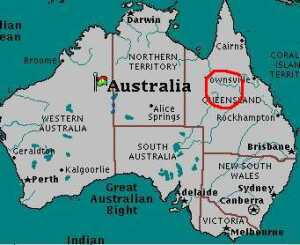 journey to motherhood. When the ship landed at Brisbane,
Queensland, Prue spent a restless week suffering in the hospital. Because labor
for hire was so hard to find in Australia (every man wanting to strike out for
himself), employers were allowed to visit incoming ships and hospitals to find
help. One such man offered a job to George, saying that if he would come and
work for him for six months on his sheep ranch, he would cure Prue’s
dysentery. George accepted the offer, and the man filled a saucer with brandy,
which he then lighted, and after the alcohol had burned away, Prue was told to
drink the residue no matter how long it took. Sip by sip the nasty stuff
disappeared, and with it the disease. As soon as her strength returned, the
three set out for the sheep ranch.
journey to motherhood. When the ship landed at Brisbane,
Queensland, Prue spent a restless week suffering in the hospital. Because labor
for hire was so hard to find in Australia (every man wanting to strike out for
himself), employers were allowed to visit incoming ships and hospitals to find
help. One such man offered a job to George, saying that if he would come and
work for him for six months on his sheep ranch, he would cure Prue’s
dysentery. George accepted the offer, and the man filled a saucer with brandy,
which he then lighted, and after the alcohol had burned away, Prue was told to
drink the residue no matter how long it took. Sip by sip the nasty stuff
disappeared, and with it the disease. As soon as her strength returned, the
three set out for the sheep ranch.
When the six months was up, Prue desired to move back into comparative
civilization, and George wanted to try his original idea of gold mining. Prue
described their return journey. "There I was in the bush from ten to
fifteen miles from any other women in any direction and my time running out. The
rancher offered us only one way to travel, and that was with the bullock team
that would come periodically for the sheep skins. When the driver arrived the
rancher tried to bribe him to not take the young couple. The driver refused the
bribe, saying, 'If the missus wants to leave I will take her.'" So off they
went under the broiling sun in a partly covered wagon full of sheep shins and
drawn by six bullocks (oxen). Prue had brought a hat and an umbrella to protect
herself from the hot sun.
After the first few days one water hole after another proved to be dried up,
giving no opportunity to replenish their water supply, and there came a day when
there was no water to pass around. The first whirlwind carried Prue’s hat
away, another one took the umbrella and the wagon cover, but by this time she
was not completely rational. What little water could be found was given to her,
and at last they came to a small settlement named Torrens Creek.
In this settlement the first child, Kate, was born on January 22, 1886. In a
short while they moved to a larger town called Black Jack. Here George William
Bannister was born on April 17, 1887, and Dan was born on January 6, 1889. Later
they moved to the town of Charters Towers. Here the day’s supply of meat was
delivered early in the morning and was cooked immediately. Vegetables were sold
by peddling chinamen whose sing-song voices were often imitated by Prue to her
children. "Turn-e-up" (turnips) and "lett-us-see" (lettuce),
they called as they tried to sell the greens. George worked in the gold mines,
where their eyelids and finger nails and teeth were examined for gold as they
came out of the shaft. It is unknown whether he ever tried to mine for himself
or not. If he did, he did not become rich.
Homes were very hard to find and their only choice in Charter Towers was
between a very large mansion and a small home. For reasons they thought good
they chose the small home which was to prove to be a costly choice. This home
had a veranda over a creek. On November 4, 1891 little Thomas Carvosa Bannister
arrived with rejoicing - no one dreaming of the tragedy creeping up on the
family. In June of 1892 little five year old George sickened and died with
diphtheria. Quickly, in the terrible heat, as soon as
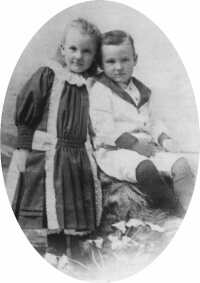 |
Kate and Dan - children numbers 1 and 3. They and 1-year old George, Jr.,
were the only survivors of 6 children born to Prudence and George in Australia.
Shown here just before embarking from North Queensland, Australia, to journey to
their new home in England.
possible after death, he
had to be buried. There was no known cure, and the other children must be
protected. The efforts were futile; one month later eight month old Thomas was
laid beside his brother struck down by the same killer and the grieving mother
knew that another child was on its way to the fold. George Bannister later
described how hard it was to watch his children suffer, "oh, it was so hard
to see the babies fight and struggle for breath. The little ones flung
themselves all over the bed. We could not even hold them still, and doctors
could not help them."
Now the doctors started to blame the house, it must be the creek somehow.
They must move at once. Now they moved into the mansion, health seemed good all
around and perhaps it was at this time that Prue began to think of returning to
England, for she started taking in boarders. About this time, George got a blast
of rock in his eyes which made him blind for some time. He took much comfort in
his banjo to pass the time away. Kate always remembered this period, and later
described her mother as she looked then; "lovely auburn hair, pink cheeks,
always smiling and singing in her pretty light colored dresses.". As George
waited for his eyes to heal, Prue cared for the home, family, and boarders. But
underneath the happy surface she grieved for the lost children and at this time
there came to her an experience which she always cherished, and which proves
that the Lord is mindful of his children everywhere when they try to keep his
laws.
"After the work of the day was done, Prue sat in her rocking chair and
went into a sleep. It seemed to her that the unborn child she was carrying was
already born and she held it on her lap and cuddled and crooned to it. The child
must have been beautiful beyond compare, for her later descriptions were so
wonderful that I heard her say, ‘If the Lord had asked me, I would have said,
Don’t take this one, Lord, take anyone but not this one’." She raised
her eyes feeling someone else in the room, and was surprised to see her own
mother, Sarah Fearn, coming toward her. Sarah took the baby out of her daughter’s
arms saying, "Don’t grieve for the children, Prue, I will take care of
them for you." With these words she left the room with the new baby in her
arms. And so came the conviction that the soul about to be born would not be
allowed to stay with her. God had sent her mother to comfort her and give her
strength.
William Bannister was born and named on March 9, 1893, and after twenty days
on earth, he returned to his Maker and was laid beside his brothers. His birth
and death were registered at the same time. A local minister, hearing of the
tragedy, and feeling bound to do his duty, astonished Prue by walking into the
house and asking, "Madam, were your children baptized into a church?."
"No sir, I don’t believe in infant baptism, least of all in
sprinkling." "Then your children have gone to hell," he said.
Prue flung the door wide open and pointing to it she said, "Where those
children have gone I will be glad to go, and if that is all the comfort you have
to offer me, there is the door."
Now the family joined a Baptist church with the Reverend Houchins as the
minister. Here they were baptized by immersion and enjoyed their membership.
This minister was a great friend to the children, taking them into the country
for a change, and giving them a kangaroo for a playmate. Later, George Jr. Came
on March 27, 1894, to help fill the vacancies left by the other three boys, and
the idea of returning to England continued to simmer under all other cares.
From
the "Scorching, sunburned land of hell" (Prue), to the rain and the green
rolling hills of the north of England
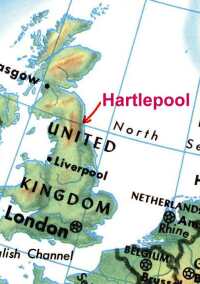 |
For the second time, Prue’s home was broken up, furnishings sold, pictures
taken, and good-bye parties held. Kate was nine years old, Dan was six, and
George Jr. was a babe one year old when Prue and the children boarded the ship
in Sydney, bound for England in the Spring of 1895. George joined the family in
July, and resumed his seagoing occupation, working on the engines of the ships.
Some of the ships George traveled on were gone a week, some went to the Far
East, and would be gone many months. He was familiar with places in all parts of
the world and entertained his family with stories galore. Anytime his ship
touched France, he was sure to bring Prue a large plain bottle of Eau de
Cologne. It made a powerful astringent when a person had a headache, and was the
only perfume she ever used. Its refreshing scent became part of Prue’s
personality to Mary.
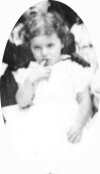 |
The
youngest picture we have of Mary
George was at sea on July 30, 1896, when a flurry of excitement permeated his
home. At 22 Cumberland Street. About midnight, the neighbor Mrs. Ward heard a
knock on the wall that was shared by their two houses. This was the signal that
she was needed, and the baby girl born that night heard the description of it
even from Mrs. Ward years later. "There I was having a beautiful sleep and
I had to wake up just to help a little bit of a baby, and what good is a
baby?" But the laughter on the dear face told her real feelings. Thus Mary
joined the family, being named after Prue’s sister, who was to claim much of
her time during the next year. Big sister Kate cared for baby Mary for many
months as Prue walked back and forth each day to nurse her sister until she
finally passed away due to dropsy.
Still being mindful of the worth of religion, the family started to attend
the Baptist church on Tower Street. But sometime after the birth of Annie on
December 29, 1899 Prue found a tract under the front door, entitled,
"Little Children Need no Baptism". This being the subject nearest to
her heart and mind she gave a hearty welcome to the two men who called later to
see if she had read the tract. Elders Jones and Spencer were married men of
thirty odd years, and were dressed in frock coats with satin lapels, and wore
high shiny hats. They explained that they were missionaries of the Church of
Jesus Christ of Latter-day Saints, and in their pleasant way they discussed the
subject of the tract.
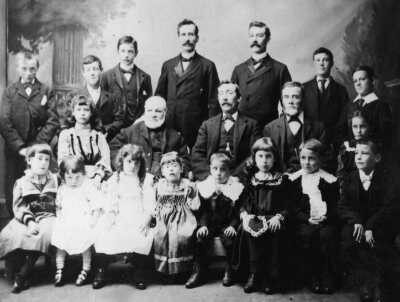 |
LDS Sunday School. Missionaries were all married men, they wore frock coats
and high hats. Mary writes of this picture: "The first Elders mother ever
knew and the only Saints and investigators in West Hartlepool at the time.
Elders Jones and Spencer in the back. Dan, at the right with the large white collar. George,
second from right in the front row. Mary 3rd from the left in the front row.
Many conversations followed on various religious topics, and when George came
home he was drawn into them also, with the result that when Annie passed away on
June 15, 1901, Elders Jones and Spencer were asked to conduct the funeral
services. Prue now made the decision that Mormonism, so called, was a divinely
restored Gospel, but in her new found joy she allowed her enthusiasm to lead her
into an indiscretion that caused a rift between her and her husband for fifteen
years. Instead of waiting for George’s return from sea and securing his
permission and possibly his company, she and Dan were baptized on July 16, 1901.
Young George was baptized on October 15, 1902. On both occasions, George was
away at sea. When George returned the second time, his reply was, "You have
got the boys, but you will never get the girls."
Soon they moved to the other end of the street, No. 97 Durham Street. Here on
July 12, 1904 little Prudence was born. So tiny she was; a head no bigger than a
teacup. Seven year old Mary thought at first that it was her own doll.
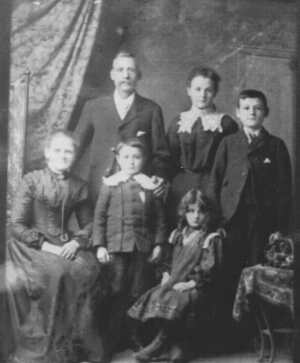 |
George and Prue and their family about 1902. Little Annie had joined the
family for a year and a half and been taken home to be with her grandmother and
three siblings, before this picture was taken. Kate was 16 (next to her Father),
Dan 14 (next to Kate), George Jr. 8 (center), and Mary 6 years in her first
colored dress - Navy blue with red silk yoke.
When Mary was twelve years old, she asked her father if she could be baptized
into the LDS Church, as she had been attending Sunday School with her brother
George every Sunday. "Why don’t you give your permission, George?",
Prue said. "You have nothing to lose and your continued refusals will only
build up a bitterness against you." Finally he replied, "All right,
tell her she can go ahead."
Eventually, fifteen years after his wife Prue was baptized, George did join
the LDS Church. This event had occurred after a most hazardous voyage during
WW1, where his ship had been held in the Baltic sea by the German navy. All the
crew abandoned ship at St. Petersburg, Russia and crossed the Baltic sea on a
sled. Somehow he managed to cross Norway and Sweden safely, and found a small
ship that was willing to risk the crossing of the North Sea to the English
coast. He lost all his possessions and was sick most of the time, but it was
better than the alternative of being caught and put in a concentration camp.
Upon reaching home, he asked for baptism. In a letter to his daughter Mary (who
was now in America), George admitted that he had known for some time that the
Book of Mormon was true and could not have been written by any man. He had been
taking the book to sea and was very familiar with all the doctrines.
So he and young Prue were baptized on the Same day in the North Sea, on 25
Jan. 1916. When he joined the Church in Jan. 1916, he was 61 years old, and
though he had been used to a pipe and a glass of beer
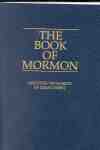 |
After
15 years of resistance and study George concluded that it "...could not
have been written by any man".
most of his life, he gave
them up and never touched them again. Eventually, George,
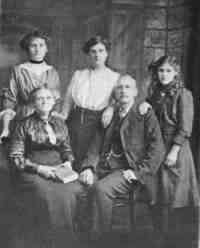 |
L
to R: Kate, Mary (about 16), Prue, Prudence and George
Prudence, Mary and
young Prudence found themselves together again in Pontiac, Michigan, near Dan
and his wife Nellie Bolton.
After Mary was married and living in Salt Lake City with her husband Clyde A.
Russell and their three little children, she visited her ailing mother and
together they made plans for her and George to move west and live with her in
Salt Lake City as soon as her health improved. At last their dreams of gathering
to the heart of Zion as a family were coming true! Prudence laid on her bed and
gazed out an open door. "Mary," she said, "I wouldn’t change
places with the Queen of England." But that evening she passed away. Though
Mary was stunned with grief, during the next two nights she had a wonderful
experience. She was "conscious of a very lovely peaceful feeling." She
was blessed with heavenly sleep, and upon waking up, she "felt full of
perfect health.... The baby had slept all night through, for the first time in
his life, and he too was very, very good. "Prue had thought mother had
tucked her in, and I knew mother had not left us. The next night repeated the
same wonderful experiences, and we were able to take care of funeral
arrangements." Mary took comfort in knowing that her mother "is united
with her four children and her dear mother whom she loved as I loved her."
During this time, Clyde sent Mary a sweet letter, "which he closed with
some of the most beautiful lines that I have ever read:
Now let there be no regrets, God never forgets
The pain and the sorrow we know
When it gets too intense, He always relents,
And off to His presence we go."
Prudence Morley Bannister was the first on the Bannister side of our family
to be baptized into the Church of Jesus Christ of Latter-day Saints. She was a
pioneer to us - she went before and prepared the way! How grateful we are that
this cheerful, determined woman had the faith and courage to recognize the truth
when she heard it. Perhaps her spirit was softened because of her trials, so she
was prepared to hear the Gospel when it was presented to her. Even though she
never reached her dream of being with her family in the heart of Zion, she made
it possible for us to be raised in the Church and strengthen the stakes of Zion
wherever we may be. Looking back on the struggles of her own and her mother’s
lives, Mary wrote, "But God is very good, and He controls all things to
work out for our good. Someday we will be fully satisfied."
May we live true to the example she set, by letting our trials soften us to
the Spirit, instead of making us bitter and hardened. Let us live true to the
Gospel that has been bought for us at such a dear price, that our ancestors will
be able to watch us from above, and "be fully satisfied."
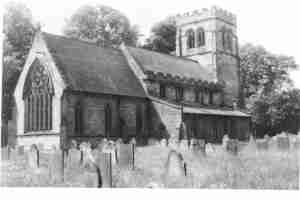
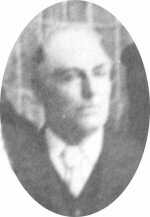
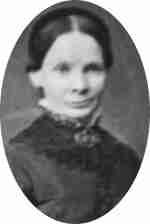
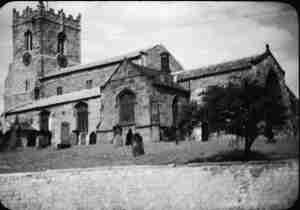
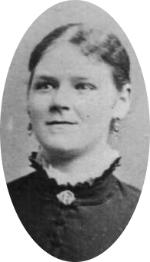
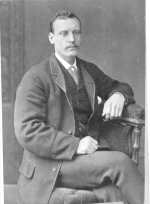
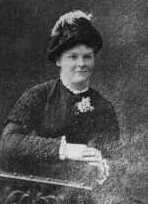
 journey to motherhood. When the ship landed at Brisbane,
Queensland, Prue spent a restless week suffering in the hospital. Because labor
for hire was so hard to find in Australia (every man wanting to strike out for
himself), employers were allowed to visit incoming ships and hospitals to find
help. One such man offered a job to George, saying that if he would come and
work for him for six months on his sheep ranch, he would cure Prue’s
dysentery. George accepted the offer, and the man filled a saucer with brandy,
which he then lighted, and after the alcohol had burned away, Prue was told to
drink the residue no matter how long it took. Sip by sip the nasty stuff
disappeared, and with it the disease. As soon as her strength returned, the
three set out for the sheep ranch.
journey to motherhood. When the ship landed at Brisbane,
Queensland, Prue spent a restless week suffering in the hospital. Because labor
for hire was so hard to find in Australia (every man wanting to strike out for
himself), employers were allowed to visit incoming ships and hospitals to find
help. One such man offered a job to George, saying that if he would come and
work for him for six months on his sheep ranch, he would cure Prue’s
dysentery. George accepted the offer, and the man filled a saucer with brandy,
which he then lighted, and after the alcohol had burned away, Prue was told to
drink the residue no matter how long it took. Sip by sip the nasty stuff
disappeared, and with it the disease. As soon as her strength returned, the
three set out for the sheep ranch.





